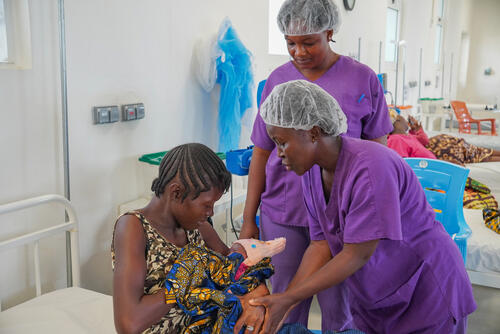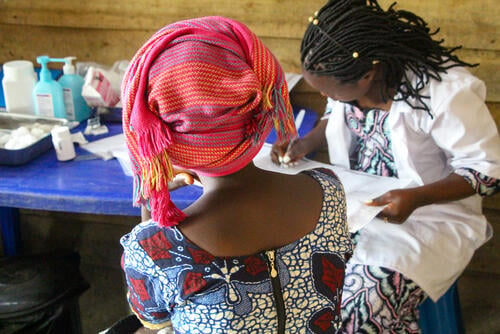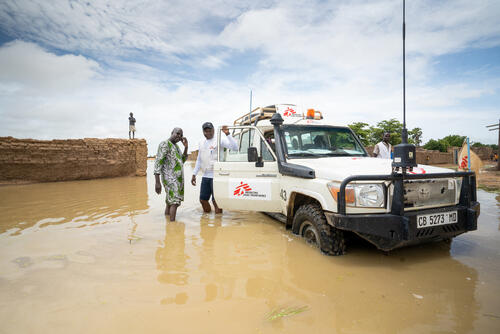Life in Kiribati, an island nation in the central Pacific Ocean, is influenced by its remote location, high disease burden and the worsening impacts of climate change. The country's healthcare system is under immense strain. With health workforce shortages, Kiribati relies on skilled and dedicated members of the community to provide care on the outer islands.
In the heart of Abaiang island, a northern atoll of Kiribati, Batiua (pronounced Besiwa) has been the sole medical assistant for six years, serving a community of 6,000 people with limited resources. Medical assistants are nurses with additional training in medical conditions and treatment pathways who can treat patients with the support of trained physicians.
Alongside doctors from Médecins Sans Frontières (MSF), Batiua provides essential healthcare, helping to tackle issues like malnutrition, infectious diseases, and pregnancy complications.
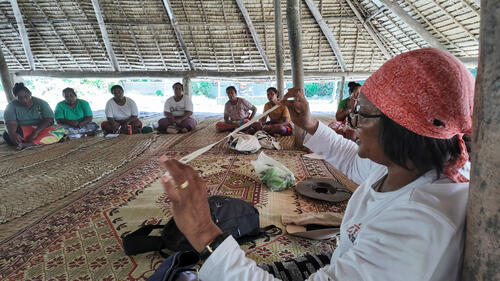
Today, patients greet Batiua when they walk into the clinic, a small single-storey cement structure surrounded by coconut trees. Here at the primary healthcare centre, she examines the first patient of the day and translates the patient’s I-Kiribati language to English for the MSF doctor. Batiua is the main focal point for all the patients, while the doctor supports in the diagnosis and treatment plan and provides guidance in patient care.
Nurses and medical assistants employed by the Ministry of Health and Medical Services provide valuable community-level care within Kiribati’s healthcare system. They play a vital role in their villages, where there are not enough staff and a high disease burden.
MSF’s medical professionals have been supporting Ministry of Health and Medical Services nurses in Abaiang since 2024.
“We focus our energies here as there is a high incidence of referrals for maternal care from outer islands to Tungaru Central hospital on the main island of Tarawa. We identified the need to support the medical assistants and nurses by implementing the community-based model of care,” says MSF medical coordinator Kiera Sargeant. This means women will be able to receive care closer to home.
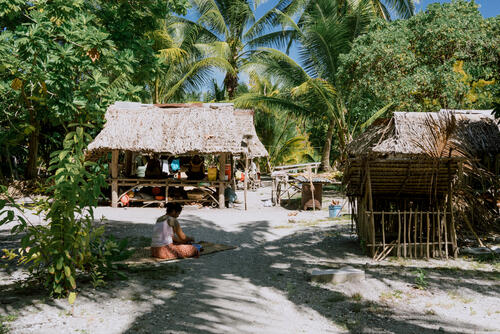
In 2024, MSF screened 888 women for non-communicable diseases in Abaiang. A quarter of the women had diabetes, with almost 20 per cent having hypertensive disorders in pregnancy. More than 60 per cent showed signs of obesity.
Among the 514 children screened nine per cent had had recent diarrhoea, emphasising the ongoing challenges related to water and sanitation.
Kiribati’s high burden of disease
Of the five patients waiting their turn for Batiua, three are pregnant women and two are children accompanied by their mothers.
When it is 10-month-old Gianna’s turn to be examined, Rutii, her mother, crouches beside her.
“Our doctor says her chest sounds better than yesterday, an improvement from when she arrived the day before,” says Batiua.
Rutii nods and smiles. “My baby, Gianna had high fever; she had difficulty to breathe. And she wasn’t eating well,” recalls Rutii. “The MSF doctor and the medical assistant asked me to admit the baby immediately. I was very worried. Now she is much better. She has started to eat.”
The impact of climate change makes children and adults more susceptible to non-communicable and communicable diseases.
Disruptions in food systems exacerbate malnutrition risks, which can lead to overweight and obesity, increasing the risk of non-communicable disease, including pregnancy-induced hypertension and gestational diabetes. This is in part due to over-reliance on hyper-processed foods and lack of arable land due to erosion, and high salinity of soil and water.

More than 15 per cent of children in Kiribati under five years of age are stunted, 3.5 per cent of children under five years of age are affected by wasting, and 90 per cent of children live in food poverty, meaning they have limited access to a diverse and nutritious diet.
Malnutrition makes children more susceptible to infectious diseases and other illnesses. “Children are affected more as it directly impacts the growth,” says Batiua.
Growing preference for imported, processed food, and reduced ability to grow food locally are some of the contributors to malnutrition and many non-communicable diseases in Kiribati. Extreme weather conditions and rising sea levels threaten agricultural production and livelihoods.
The climate crisis is a health crisis
Most patients at the clinics on the outer island of Abaiang are women.
While Kiribati has some of the highest burdens of disease in the Pacific region, it has one of the lowest rates of access to primary healthcare, increasing the vulnerability of pregnant women and children. MSF is helping women have safer pregnancies by working with local health workers to help diagnose and treat diabetes and hypertension in pregnant women.
Any cases, including high-risk pregnancies, that are not treatable at the clinic are referred to the Tungaru Central hospital in the capital, Tarawa, via a two- to four-hour boat trip or a flight which leaves once or twice a week.
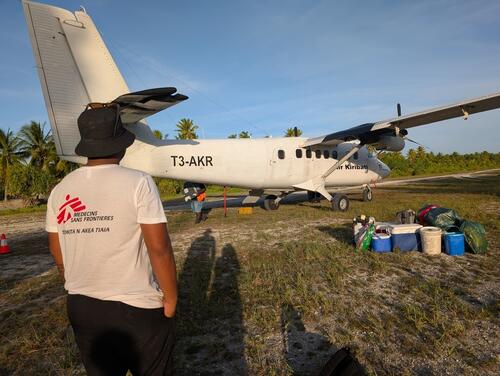
“Transporting a critical patient is always a challenge,” says Diana, the nurse at Takarano clinic on the north of the island. A single nurse or medical assistant is responsible for each clinic.
“It’s a big relief to the island when we have MSF’s doctor Joseph, as he has more medical knowledge,” says Batiua with a smile.
For the people of Kiribati, the climate crisis is a daily health threat. Rising sea levels contaminate freshwater, increasing diarrhoeal diseases, while extreme weather disrupts food supply, worsening malnutrition. Warmer temperatures fuel mosquito-borne illnesses like dengue, and heat stress impacts those with heart disease and diabetes, as well as pregnant women. These challenges, combined with limited healthcare access, create a worsening cycle of poor health.
Improving access to clean water
Accessing clean, safe water is a daily challenge for people in Kiribati. Shallow groundwater, which is contaminated with seawater, rubbish and other waste, is the main drinking water. The limited access to potable water supply at the clinic poses a significant challenge, affecting both patient care and clinic sanitation. With no running water on the island, the health clinics rely on rainwater or water carried from nearby homes.
“We’re also working on geo-mapping the various water wells so the community has more information about the water quality in each well and can make healthier choices about where they get their water.”MSF medical coordinator, Kiera Sargeant
The Ministry of Health and Medical Services is making efforts to secure a water supply. MSF has also been working with the ministry to test the quality of water in the groundwater table on the island and looking at how this correlates with health conditions such as hypertension or diarrhoea in pregnancy.
“We’re also working on geo-mapping the various water wells so the community has more information about the water quality in each well and can make healthier choices about where they get their water,” says Kiera.
The primary sources of freshwater are underground freshwater lenses and rainwater harvesting. Groundwater wells can be salty or contaminated by bacteria.
Remote island logistics
Kiribati faces unique geographical challenges that impact nearly every aspect of daily life, including healthcare, transportation and waste management. Spread across 33 atolls and reef islands, the country’s vast distances and limited infrastructure make it difficult to transport essential medical supplies, access specialised healthcare, and manage waste effectively. Many outer islands rely on infrequent boat or air transport for critical supplies, and delays can lead to medicine shortages and limited healthcare access. Meanwhile, the lack of proper waste disposal infrastructure poses environmental and health risks, with medical waste often accumulating in unsafe conditions.
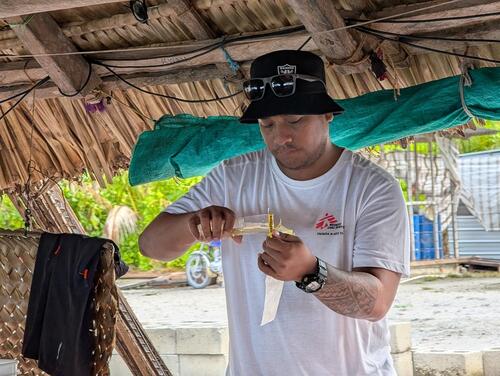
The remote location, high disease burden and worsening effects of climate change continue to place immense strain on Kiribati’s healthcare system. With a growing population facing increasing health challenges—including malnutrition, non-communicable diseases, and limited access to clean water—the need for sustained medical support is critical.
MSF’s partnership with the Ministry of Health and Medical Services aims to provide medical care to people, strengthen pharmacy management and improve sanitation efforts. Working in collaboration with medical professionals at all levels, tertiary to grassroots, has been one of the key pillars of the collaboration. Nurses and medical assistants like Batiua find joy in helping people.
“My mission in life is to eradicate malnutrition in Abaiang, especially among children under five,” she says.




